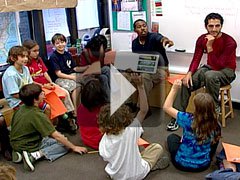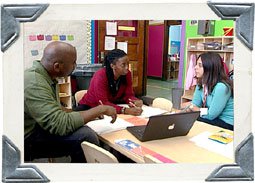Bank Street College of Education: Hands-On Training and Mentoring Create Leaders
Where graduate students and kids learn side-by-side.
Your content has been saved!
Go to My Saved Content.
Anyone who wants a snapshot of New York City's Bank Street College of Education should arrive between 4 and 5 P.M. The graduate school owns and runs the P-8 School for Children, with which it shares several floors. After-school activities keep many kids there past 4 P.M., when the graduate students begin arriving for instruction.
Classrooms, bathrooms, gym, library -- they're all shared by kids and adults. Jon Snyder, dean of the graduate school, says, "You have a mass of people that want to become teachers walking into the building while simultaneously passing kids who are leaving."
This commingling of age groups is a tradition at Bank Street, founded in 1916 by progressive educator Lucy Sprague Mitchell as a center for experiential learning. Today, the school is renowned for its pioneering efforts in the Head Start program, children's literature, and educational technology, as well as its hands-on, two-year graduate program, focused on P-9 instruction.
Bank Street's approximately 1,000 graduate students complete a year of fieldwork in various New York City classrooms. Essential to the experience is hands-on training, in which partner-school teachers and Bank Street faculty mentor the prospective educators. In addition, groups of five to seven candidates meet weekly with a faculty member to critique their field experiences.
The faculty, Snyder notes, consists of top-notch elementary school and middle school educators who excel at training aspiring teachers. No scholarship is required, and there's no tenure. "Everybody is on a one-year contract," he says.
The independent School for Children is the realization of Mitchell's vision of experiential education, which includes building blocks, role-playing, and working with media. The twenty-three-student classrooms typically have three adults each, two of whom -- an assistant teacher and a student teacher -- come from Bank Street.

One philosophical cornerstone, featured in the coursework and applied in the field, is constructivism, the idea that kids (and all humans), not their teachers, make meaning by drawing their own conclusions from experiences inside and outside the classroom. Accordingly, Bank Street courses cover kids' learning styles as well as their family, community, and cultural backgrounds.
Another Bank Street tenet, the "democratic ideal," is embedded in the college's Partnership for Quality program, through which select candidates work as paid interns in what used to be four poorly performing Bronx schools. The schools, in return, receive professional-development assistance. In the last four years, the teacher-turnover rates have decreased -- in one school by as much as 25 percent -- and the K-8 students are progressing faster.
Snyder has high hopes for alumni -- of whom 88 percent are still teaching after five years. "Evidence shows that no matter where our students end up, they more rapidly assume leadership roles than other teachers. We hope they can begin to change things one school at a time."
Vital Stats
- Location: New York City
- Degree conferred: Master's
- Annual graduating class: 350-400
- Time in the field: 1 year
- Highlights:
- The School for Children
- Partnership for Quality, a professional-development collaboration
- Bank Street Bookstore, on-site and online store for children
- Bank Street Corner, a professional-development Web site for all educators